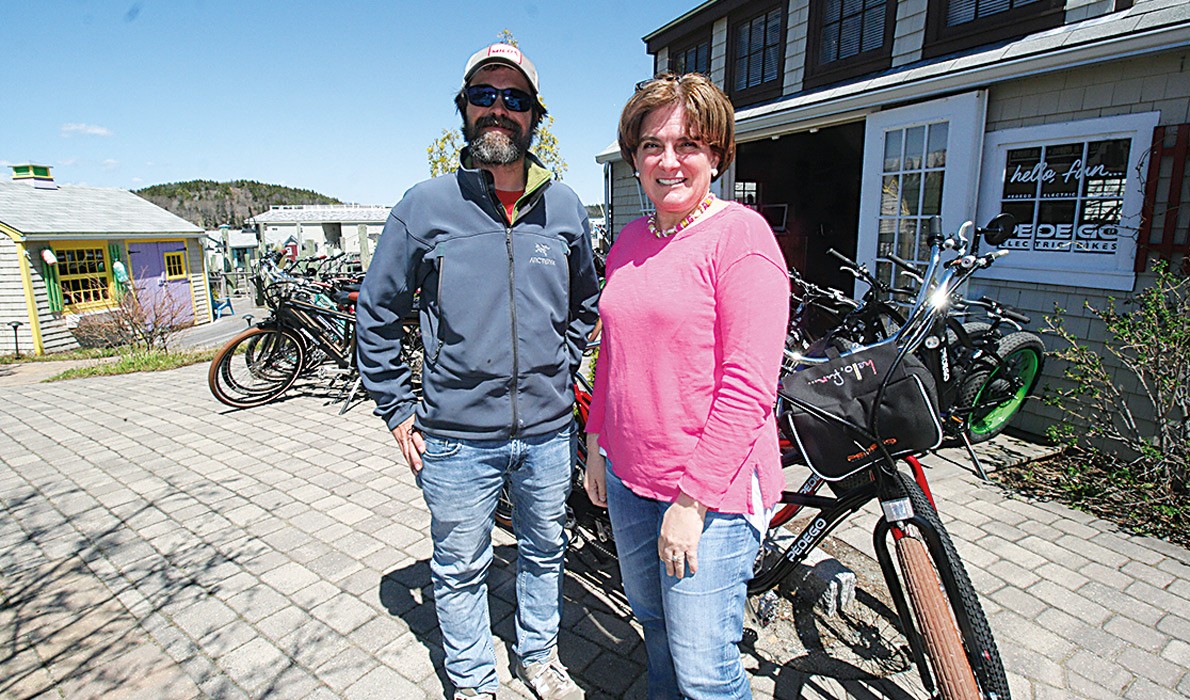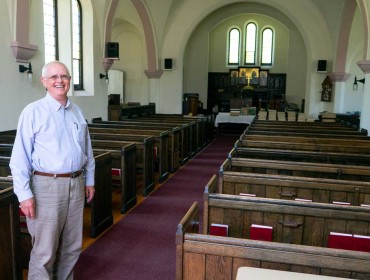Posted May 17, 2018
Last modified May 17, 2018
Anne Watson tried out a Pedego electric bicycle one summer and loved it.
Watson, a former school superintendent in Connecticut, has visited Great Cranberry Island every summer since she was a baby, and for the past two years has lived there year-round. But with summer rolling around, she can be found at her new store, Pedego Acadia, on the Bar Harbor waterfront.
“I was up here and I rode an electric bike for exercise,” she said. “I ended up loving it and wondered why everybody didn’t have one.”
She and store manager John Cabe opened the small shop on a whim last August and found the electric bikes were in hot demand.
“We did so well that we’re back again,” she said. “We had them rented out constantly. I’m trying to build it up with locals, too, as a green way to commute.”
Electric bikes have been popular in Europe for years, and are catching on in the U.S., said Cabe.
According to its website, Pedego Electric Bikes was founded in 2008 in California. The bike motors are regulated to not exceed 20 miles per hour, and have a range of 15 to 60 miles, depending on the battery, rider weight, terrain, weather, speed, and level of pedaling. The battery takes 2 to 6 hours to charge. The U.S. bikes are distinguished in part by their employment of throttles which, according to the website, are forbidden in Europe. Throttles are especially helpful for getting started from a standstill, getting a burst of power to climb a hill, or getting through an intersection. Models include cruisers, tandems, commuters, fat-tire bikes, mountain bikes, cargo bikes, and folding bikes.
Watson’s store, at 55 West St., is the brand’s 107th and offers rentals and sales.
“We’ve had people take the tandem and ride from here all the way to the Bass Harbor Lighthouse,” a round-trip of more than 30 miles, said Cabe, who came to the business from the restaurant industry. “You can put in as little to as much effort as you want. You can put in zero effort. And if you do any pedaling at all, it will extend your range.”
“You can literally climb a mountain without feeling any pain, smiling the whole way,” Watson says in a promotional video on her website.
The shop is just a block from the town wharf, where cruise ships land their passengers. The bikes are big with those passengers, other tourists, and locals on their lunch break or day off, said Watson. Watson and Cabe said they’ve noticed electric bikes increasingly used by local college students, summer residents, and islanders.
“It’s a great vehicle to have on an island, for people who can’t afford cars or who don’t want a car, or when cars aren’t allowed on an island,” said Watson. “And it’s easier to get a bike back and forth on a ferry instead of a car.”
The two have a push on to increase electric bike awareness as an environmentally sustainable transportation alternative. They’re planning a “Pedego commuter challenge” that will allow commuters to use a Pedego bike if they give up their cars for a week.
“There are numerous people who commute to Bar Harbor from Northeast Harbor or Bass Harbor who could easily be riding our bike,” said Watson. Cabe, who lives in Gouldsboro, said that now that weather is getting warmer, he’ll be taking the ferry over from the Schoodic Peninsula to Bar Harbor with his electric bike.
They’ve taken officials at Acadia National Park on an electric bike outing, coinciding with the park’s release of a proposed transportation plan to reduce car traffic at Acadia hot spots. They offer free trials to prospective customers. They’re looking at trailers that would make it possible to do tours for people with disabilities. They donated a bike last year, and plan to again this year, to Friends of Acadia for their annual auction. And they’re seeking out other community organizations that would benefit from donated bikes.
“We really want to benefit the community,” said Watson.
Contributed by




